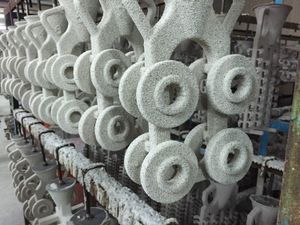To say that something has been fabricated is a relatively small claim. Fabricated things have been made, fashioned, or built, presumably by a person or group of people and as a result of some specific intention or set thereof. Fabricated things have been willed into existence; if an object was fabricated, then there was an earlier time in which it didn't exist. The shirt I'm wearing, the chair I'm sitting in, the laptop on which I type these words – all of these were fabricated. I suppose you could say as well that the concrete slab my chair sits on was fabricated, in the sense that it was made, but then again it wasn't really fashioned, and ultimately there are probably better words (constructed, maybe, or more to the point mixed and poured and allowed to cure).
In earlier definitions, manufactured meant more or less the same as fabricated. Originating from the Latin roots for "hand" and "a working," manufactured things were originally just stuff that had been made. But starting in the industrial revolution, manufacture began to imply repeatability and scale, and today a thing can only be called manufactured if it was made alongside other things, in a system which utilizes interchangeable parts and has at least some concept of repeatable, consistent precision. We can note a few things that it is not generally possible to manufacture, including prototypes, which are of course made before manufacturing commences. Similarly, basically anything that is designed- or engineered-to-order should be thought of as fabricated rather than manufactured.
The verbs to fabricate and to manufacture map imperfectly onto the nouns denoting the places in which they are done: workshop and factory. More or less without exception (if you can think of one, please send me a note), manufacturing happens in factories — but fabrication can and does happen in factories as well. Workshops, on the other hand, are simply places where work is done. Fabrication is certainly possible there; so is research, and development, and maintenance, and repair. Even tinkering counts as work and can be done in a workshop, which derives from the Old English weorc for, among other things, a "discrete act performed by someone."
Let's just repeat that phrase: "A discrete act performed by someone." I find this definition wonderful, and bizarre. I feel myself nodding along with it: yes, discrete; yes, an act; yes, someone. There are certainly other ways to think about work — as directed towards an explicit goal; as performed in a professional or at least economic context; as inseparable from the continuous stream of anthropogenic action. But when I think of my own time in the workshop, I find it comforting to keep this phrase in mind.
SCOPE CREEP.
- Actually, here's a potential counterpoint to my claim that manufacturing happens exclusively in factories: Are fast food restaurants engaged in manufacturing? McDonalds prioritizes repeatability, scale, and interchangeable components; would it be appropriate to call the work done in their restaurants manufacturing?
- I'm blasting through Hogs Wild, Ian Frazier's collection of "reported pieces," which is read with care and humor by the author. In a thoughtful review in the New York Times, Carlo Rotella notes that the reported essay deserves to be judged both on its informativeness and also "on traditionally literary grounds: elegance of expression, quality of voice, presentation of its subject from a perspective yielding not only insight but also fresh feeling." On all of these counts, I find Frazier's writing to be superlative.
- Priya Krishna visits the factory that manufactures Smarties (the candy) in Union, NJ.
- A feature article on the full-scale replica of Shibuya Crossing, the famous intersection in Tokyo. The real intersection is a popular reference point in film and TV, but is difficult to film at because it's so busy. The full-scale replica, which is located 80 kilometers northwest of Tokyo, has extensive green screens and allows for set pieces, like this one, that would be difficult to create otherwise.
- It turns out that it is possible to securely blur sensitive data in image files — by filling the area to be blurred with color data from other areas of the image.
- In printed circuit board assembly, a copper coin is a cylindrical or hat-shaped chunk of copper which is pressed into or through the printed circuit board, typically to improve heat dissipation.
- A good, short essay on Weetabix, the British breakfast cereal: its origins (WWII wheat shortages and post-WWII domestic frugality) and supply chain (small British farmers, supplied by multinational ag-tech firms and intermediated from the cereal brand itself by the agricultural trading company Cargill).
Tangentially related, here's a very good profile on the Hunts Point Produce Market, which is probably in my top five infrastructure sites in New York City; my own photos & videos of a 2018 tour are here. - The other day, while looking for the photo at the top of Wednesday's newsletter, I came across a video of my wife and I early in our relationship. In the background is playing Curtis Mayfield's "Think," an instrumental track from the Super Fly soundtrack; I had mostly forgotten about it, but have replayed it for my kids multiple times since. Other songs on my mind: Big Thief's "Not," which I heard a cover of at a Mount Kimbie concert a few days ago; The 1975's "Yeah I Know," whose video is as challenging as the song is soothing; all of DOMi and JD Beck's NOT TiGHT, which I played hard last summer and which I'm happy to be revisiting now.
Thanks as always to Scope of Work’s Members and Supporters for making this newsletter possible. Thanks also to Mayo, Nick, Michael, and Anthony for helping source links this week.
Love, Spencer



